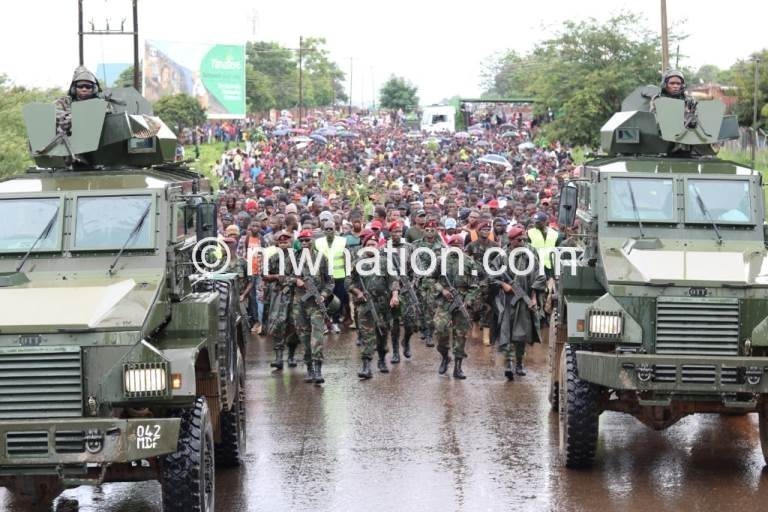Soldiers who saved democracy
Malawi boasts of patriotic soldiers that saved this nation more than four times from self-destruction.
One cannot hazard a guess what would have befallen the nation had the Malawi Defence Force (MDF) slackened in their line of duty.

Amid the tricky one-party rule of founding president Hastings Kamuzu Banda when the price for daring those in power was either death or detention without trial if not exile if you were lucky, the military boldly stood up against the dictator to protect the nation they vow to defend to death.
In 1993 when Malawians could only talk in muted voices for fear of Kamuzu and his minions, the death of a soldier in a fistfight in Mzuzu triggered ‘Operation Bwezani’ in which they disarmed the Malawi Young Pioneers (MYP).
The soldiers dismantled the paramilitary wing armed by Kamuzu’s 31-year regime at the height of resistance to tyranny and the immutable transition to multiparty democracy.

This followed demands in May 1993 by opposition groups represented at the National Consultative Council to trim MYP powers ahead of the 1993 Referendum.
In June that year, Malawians aged over 21 would vote whether to continue with the one-party regime or embrace democracy.
The heroic operation is often credited to the middle-ranking officers who reportedly pounded MYP establishments nationwide after senior generals loyal to Kamuzu had refused to give a go-ahead.
The soldiers placed General Isaac Yohane Chiunge under house arrest, stopping him and his top brass from issuing orders.
The worst-hit was the MYP headquarters, which now lies in ruins near the head office at Kamuzu Institute of Youth in Lilongwe. The soldiers went away with assorted weapons, incapacitating the Malawi Congress Party (MCP) armed wing in time for transition to democracy. The now-defunct youth wing Kamuzu’s regime had planted in various State institutions to spy and defuse tormented the nation since its inception in the 1960s on the pretext of developing and harnessing the skills and energy of youthful Malawians.
Governance experts fear what would have befallen Malawi if MYP was left armed to the teeth during the wind of change fanned by opposition pressure groups and Catholic bishops’ scathing pastoral letter in 1992.
But this was not the last time the soldiers saved the nation when it mattered.
During Bakili Muluzi’s 10-year reign, MDF did not interfere in politics even when the first president in the post-dictatorship era desperately attempted to push for the infamous constitutional amendment to prolong his rule.
The soldiers kept a distance during the open-term bid and third-term bid.
However, they stepped in to protect constitutional order when Muluzi’s successor, Bingu wa Mutharika, suddenly died of heart attack in April 2012. The misfortune left Democratic Progressive Party (DPP) elites opposed to then vice-president Joyce Banda’s takeover, for she had been sacked from the party to pave way for the deceased’s brother, Peter.
There was no love lost between Bingu and his deputy, who founded People’s Party (PP) after being accused of forming parallel structures outside DPP.
Just when Banda’s takeover looked certain, DPP stalwarts called ‘Mid Night Six’ convened a press briefing at night where they urged the military top brass to take over until a solution was found.
However, the MDF commander general Henry Odillo resisted the offer, allowing the country’s first woman president to rise in peace.
That was another victory for the uniformed heroes, much to the chagrin of the Mid Night Six. They comprised then ministers Patricia Kaliati, Nicholas Dausi, Henry Mussa, Kondwani Nankhumwa, Symon Vuwa Kaunda and Jean Kalilani, who were later charged with treason, but had their cases discontinued.
But politicians are what they are—fickle when the end suits their interests.
Not learning from past experiences, Banda, facing imminent defeat to DPP’s Peter Mutharika in the 2014, asked the Odillo-led military to shut down the main tally centre, alleging rigging.
However, Electoral Commission chairperson, the late Maxon Mbendera, told journalists the commission’s employees were tensed up by the instruction for the soldiers to stop vote counting and order a recount.
The military rejected the political order and the commission declared Mutharika winner.
But Peter Mutharika had his own dose of military professionalism when the soldiers took sides with civilians by protecting anti-regime protesters under siege from pro-regime ruffians.
Mutharika later fired MDF Commander Vincent Nundwe for shielding the civilians in serial protests against his narrow re-election in the 2019 presidential poll nullified by the courts.
APM replaced Nundwe with Andrew Namathanga.
Political scientist Makhumbo Munthali said the ex-president, who was voted out in the fresh election of 2020, might have calculated that Namathanga would protect his party in future.
“It was well-known that Mutharika appointed General Namathanga to serve his narrow selfish political and nepotistic agenda prior, during and after 2020 Fresh Presidential Election,” he said.
However, Namathanga proved critics wrong when opposition leader Lazarus Chakwera of the Tonse Alliance defeated Mutharika in the court-sanctioned poll.
The military remained steadfast and provided necessary security for smooth transition after Mutharika dubbed the vote as “the worst poll in Malawi’s history”. Both local and international observers said it was credible, free and fair.
“The soldiers also provided security to Chakwera and Vice-President Saulos Chilima during the sensitive elections’ case that led to the cancellation of the 2019 presidential results,” Munthali said.
Chakwera later sacked Namathanga and reinstated Nundwe “to correct the wrong”.
Security expert Sherrif Kaisi said the MDF’s discipline dates back to its genesis as an offshoot of Britain’s King African Riffles.
“Since then,” he said, “the country’s defence force pays its loyalty to the nation, not political parties.”
Kaisi opined that the worst would have happened had the military not taken sides with Malawians. The story of their resolute resistance to political intrusion makes MDF unsung heroes in Malawi’s democracy, the symbol of how professionalism and strong institutions can save a future of a peaceful nation on the brink of sliding into anarchy.





